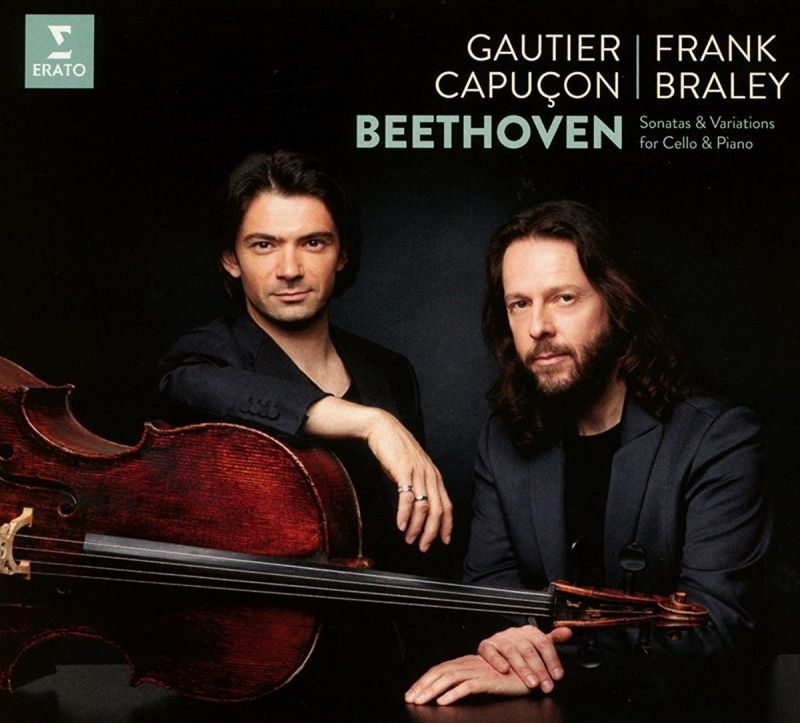BEETHOVEN Complete Sonatas and Variations for Cello and Piano
View record and artist detailsRecord and Artist Details
Composer or Director: Ludwig van Beethoven
Genre:
Chamber
Label: Erato
Magazine Review Date: 11/2016
Media Format: CD or Download
Media Runtime: 144
Mastering:
DDD
Catalogue Number: 9029 59511-3

Tracks:
| Composition | Artist Credit |
|---|---|
| Sonata for Cello and Piano No. 1 |
Ludwig van Beethoven, Composer
Frank Braley, Piano Gautier Capuçon, Cello Ludwig van Beethoven, Composer |
| Sonata for Cello and Piano No. 2 |
Ludwig van Beethoven, Composer
Frank Braley, Piano Gautier Capuçon, Cello Ludwig van Beethoven, Composer |
| Sonata for Cello and Piano No. 3 |
Ludwig van Beethoven, Composer
Frank Braley, Piano Gautier Capuçon, Cello Ludwig van Beethoven, Composer |
| Sonata for Cello and Piano No. 4 |
Ludwig van Beethoven, Composer
Frank Braley, Piano Gautier Capuçon, Cello Ludwig van Beethoven, Composer |
| Sonata for Cello and Piano No. 5 |
Ludwig van Beethoven, Composer
Frank Braley, Piano Gautier Capuçon, Cello Ludwig van Beethoven, Composer |
| (7) Variations on Mozart's 'Bei Männern, welche |
Ludwig van Beethoven, Composer
Frank Braley, Piano Gautier Capuçon, Cello Ludwig van Beethoven, Composer |
| (12) Variations on Mozart's 'Ein Mädchen oder We |
Ludwig van Beethoven, Composer
Frank Braley, Piano Gautier Capuçon, Cello Ludwig van Beethoven, Composer |
| 12 Variations on a theme from Handel's Judas Maccabeus |
Ludwig van Beethoven, Composer
Frank Braley, Piano Gautier Capuçon, Cello Ludwig van Beethoven, Composer |
Author: Harriet Smith
Whereas with Phillips/Guy and Jean-Guihen Queyras/Alexander Melnikov there’s a clear sense of the players egging one another on, here the partnership is more one of Classical balance, and the result is by turns poised, polished, intimate and exuberant. Capuçon’s lustrous sound is immediately recognisable, and melodies, when they emerge, are sung with palpable enjoyment. Just sample the Adagio sostenuto introduction to Op 5 No 1, by turns confiding, warmly ardent and gracefully skittish; or the brief Adagio cantabile of Op 69, which is spacious and touching (Braley the most sensitive of pianists) and segues into the uproarious Allegro vivo with complete inevitability in their hands.
The opening of the Second Sonata yields almost as many interpretations as there are recordings. You’re aware of the relatively generous acoustic of the new set, which may not be to all tastes. However, the pacing of Capuçon and Braley is entirely natural, their interplay both considered and considerate. But what it lacks, to my mind, are the extremes of, say, Phillips and Guy or the sense of latent menace that the vibrato-free Queyras finds with Melnikov. The Rondo of the same sonata can be a tricky movement to pace. Phillips and Queyras are both fleet, Isserlis slower (but he brings it off). There’s just a slightly uncomfortable edge to the similarly steady Capuçon – as if he’s more buttoned-up than he wants to be. But if I have caveats about the Second Sonata, that’s more than made up for elsewhere.
The Fifth Sonata seems to suit them particularly well, the accentuation in the first movement strong but never bludgeoning. And Braley is ever sensitive, careful never to become overbearing. The moments of introspection too are conveyed with great beauty. The Adagio is faster-paced than Phillips but it allows the musicians to bring a hymnic simplicity to the music that is very winning. As it grows in intensity, Braley really relishes the sonorous writing deep in the piano’s bass. And their fugal finale has wit without losing sight of elegance: it’s very sophisticated playing. Others may joke around more (Queyras in particular) but there’s no doubting the cumulative impact of the Capuçon/Braley approach. Of the variations, they’re particularly scintillating in the ‘Ein Mädchen oder Weibchen’ set from Mozart’s Magic Flute, and they find more meat in the ‘Conqu’ring Hero’ Variations than many of their colleagues.
In the end, how you react to this will depend on your taste in Beethoven. If this new set questions received opinion less dramatically than the versions listed below – all of which draw to a greater or lesser extent on period-instrument thinking – this new set from Capuçon and Braley is undeniably a class act. But if you like your Beethoven a touch more anarchic, then it is Phillips and Guy whom I would recommend above all.
Discover the world's largest classical music catalogue with Presto Music.

Gramophone Digital Club
- Digital Edition
- Digital Archive
- Reviews Database
- Full website access
From £8.75 / month
Subscribe
Gramophone Full Club
- Print Edition
- Digital Edition
- Digital Archive
- Reviews Database
- Full website access
From £11.00 / month
Subscribe
If you are a library, university or other organisation that would be interested in an institutional subscription to Gramophone please click here for further information.





